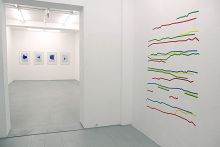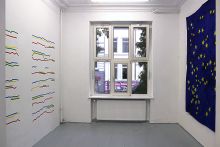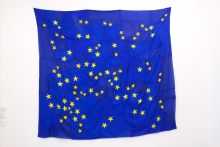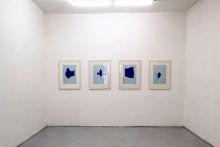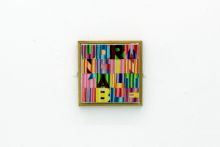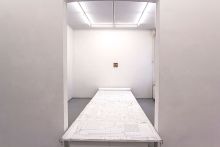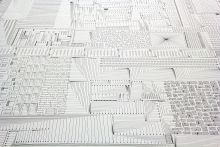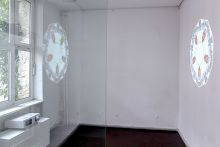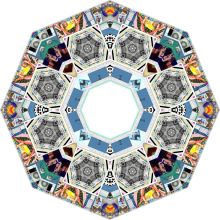
- Alighiero e Boetti, KP Brehmer, Valentina Roselli, Caterina Rossato, Serena Vestrucci
- Un'idea brillante
- from till
- Tuesday - Sunday, - (closed on Monday)
- Francesco Urbano Ragazzi
- Arnoldstraße 26 -30, Hamburg
On the twenty year anniversary of Alighiero e Boetti’s death, an exhibition at Künstlerhaus Frise in Hamburg celebrates the artist’ heritage throughout the works of three young Italians: Valentina Roselli, Caterina Rossato and Serena Vestrucci. To play the counter-melody, a contemporary of Boetti who -like him- dedicated his life to the rigorous analysis of cultural codes: KP Brehmer, representative of Capitalist Realism, who was a professor in the same Hamburg. A summer manifesto for an anti-creative art
What happens to an ingenious idea when it is repeated infinite times? Does it increase its power or does it water down until when it is exhausted? This seems to be the paradox carried within by Un'idea brillante, one of the tapestries realised by Alighiero Boetti during the year of his death, in 1994. The writing, easily readable through the coloured braids of the embroidery, is contradicted by the quite evident reality that the work is only the last, amongst the hundreds of variations the artist has produced since the beginning of the 70s. Again: the medium negates the message. What does a stroke of genius have to do with embroidery, a technique that more than anything else requests a lot of patience?
Starting exactly from this work, on the occasion of the vicennial of the death of Alighiero Boetti and the first cultural Venice-Hamburg twinning scheme promoted by Nuova Icona and Frise Künstlerhaus, three Italian female artists reflect on a certain Boettian inheritance, from which their practice originates. Un'idea brillante becomes the title of the show of Valentina Roselli, Caterina Rossato and Serena Vestrucci which opens Wednesday 20 August at 20 h at Frise Künstlerhaus in Hamburg, curated by the duo Francesco Urbano Ragazzi. The day after the opening of the exhibition, at 19h, there will be a public talk by with Vittorio Urbani (Nuova Icona) and Sabine Mohr (Frise Künstlerhaus).
It is not Boetti alone, to stand as historical comparison to the three artists. The second name from which the exhibit determines its moves comes from the German city itself. It is KP Brehmer, a prominent figure of Capitalist Realism who was brought back to the attention of the general public during the last Venice Biennial, and who taught at the University of Hamburg for almost thirty years. With regard to the production of Boetti and Brehmer, what is especially acknowledged is the rigorous work on the notion of code. Every artwork, instead of being the result of what we inexpertly call creativity, generates itself via an automatism or a set of rules that the artist imposes to himself. The resulting object or image then exists not as an exercise of willpower but, on the contrary, thanks to a limitation of it. This is the case of Mind Map, a ten metres-long roll of paper on which Caterina Rossato schematises notions and connections acquired during the time of production of the work itself. Or Studio Quotidiano (Daily Study), which works as a soundtrack to the show: an audio trace in which we hear the tapping of fingers on a silenced piano. To be played is the Prelude op.12 n.104 in Si minor by Felix Mendelssohn.
On the other hand, a point of absolute difference is the way in which the two generations confronted in this show treat political signs and symbols. If KP Brehmer used to transform elements of neutral significance in über precise illustrations of the social situation of his time - for example, altering the proportions of colours of the German flag on the basis of wealth distribution among the segments of population - on the contrary, Serena Vestrucci takes out of the political context forms which become purely aestheticised objects. In Strappo alla Regola (Exception to the Rule) the yellow stars of the European flag have been cut and reconstructed to form the constellations of a big blue sky. If Boetti worked with both the right and left hand in order to multiply his subjectivity, the young artist does the same to double her hours of work, adhering to the rhythm of the capitalist precariat.
In between the heritage and the betrayal of this genealogy remains the quest of a measurement for the world, which can’t avoid but to overcome itself. Valentina Roselli engages herself in discovering if there yet exists, for the human genre, a territory of conquest, a place where to lose one’s own identity. She does so through a series of digital mandalas, which will mark the rhythm of time of the exhibition with a daily reference among the expository space and the web. Where there was Boetti’s Kabul, maybe now there is a land of uncertain borders, divided between real and virtual, between matter and hallucination. Un'idea brillante realises the dream of every artist: to become the machinery for an infinite and eternal work. Against any ideal of newness.


